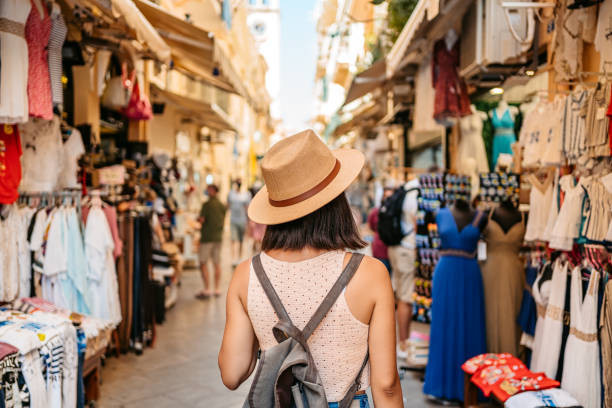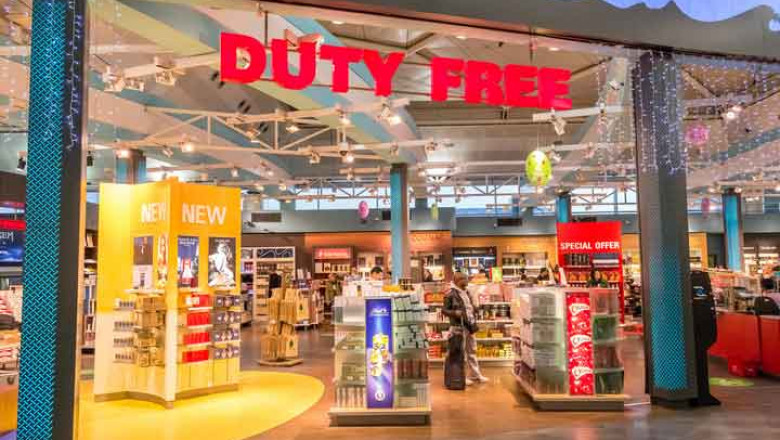views
Why Are Avolta (DUFRY) and Lagardère Leading the Travel Retail Sector?

Introduction:
The travel retail sector has undergone significant transformation in recent years, driven by evolving consumer preferences, technological innovation, and strategic mergers. Two companies that have cemented their dominance in this competitive market are Avolta (formerly Dufry) and Lagardère Travel Retail. These global players have not only adapted to changing consumer behavior but have also taken proactive steps to shape the future of travel retail. Avolta and Lagardère’s strategies, especially in terms of leveraging digital transformation and responding to the globalization of consumer preferences, are central to their success. In this article, we explore the key factors that have made Avolta and Lagardère the powerhouses of the travel retail industry, focusing on how they have capitalized on global consumer trends and digital innovation.
The Rise of Avolta in Travel Retail
Avolta’s journey to becoming a leading force in travel retail began with its rebranding from Dufry to Avolta, a shift that reflected the company’s evolving identity. Avolta has a long history in the industry, having been a major player in duty-free and travel retail for over 20 years. In recent years, the company has undergone a transformation, expanding its reach and diversifying its offerings. The pivotal moment in Avolta’s growth came with its merger with Autogrill, a prominent operator in the food and beverage industry, in 2022. This merger allowed Avolta to combine retail operations with food & beverage services, a move that was essential in catering to the increasingly diverse and sophisticated needs of modern travelers.
The global expansion strategy of Avolta has seen the company establish a strong presence in over 60 countries, making it a dominant player in both developed and emerging markets. One of Avolta’s key strengths is its ability to tap into emerging markets in Asia and Latin America, regions where air travel is expanding rapidly, and consumer behavior is shifting. The company’s success in these regions is a testament to its ability to adapt to local preferences while maintaining its global brand identity.
In 2024, Avolta reported a revenue of CHF 12.79 billion, a significant achievement that showcases its resilience and ability to thrive despite challenges such as the global pandemic. The company’s growth can be attributed to its digital transformation initiatives, strategic partnerships, and the ability to cater to the globalization of consumer preferences.
Lagardère’s Innovation and Expansion in Travel Retail
Lagardère Travel Retail, like Avolta, has been an influential player in the travel retail market. The company has built its success on offering unique, high-quality products and services that appeal to the changing demands of modern travelers. Unlike many of its competitors, Lagardère has focused on creating a more personalized and luxury-oriented retail experience. For instance, the company has introduced exclusive products such as Della Vite Prosecco, which appeals to travelers looking for premium, sustainable goods.
Lagardère’s global footprint extends across Europe, Asia, and the Americas, where it continues to expand its operations through strategic acquisitions and partnerships. The company’s presence in emerging markets has been particularly strong, as it has capitalized on the growth of airports in Asia and the Middle East. Lagardère’s ability to adapt its offerings to the local culture while delivering globally recognized brands is a key part of its strategy.
One of Lagardère’s notable strengths lies in its focus on food and beverage concessions, which complement its retail offerings. The company has secured key food and beverage contracts in major airports, such as Frankfurt Airport’s new Terminal 3, set to open in 2026. This move highlights Lagardère’s commitment to offering a holistic travel experience, where passengers can shop, dine, and relax all in one place. In addition, Lagardère has embraced digital transformation by incorporating digital technologies such as mobile apps and interactive displays, creating a more engaging shopping environment for travelers.
Digital Transformation: Shaping the Future of Travel Retail
Avolta and Lagardère are both pioneers in digital transformation within the travel retail sector. With the rise of digital technology, both companies have taken proactive steps to integrate innovative solutions into their retail operations. From enhancing the in-store experience to streamlining the shopping process, the digital transformation has been essential in keeping pace with the expectations of today’s tech-savvy travelers.
Avolta has invested heavily in digital tools such as mobile apps, self-checkout systems, and in-store digital displays. These technologies not only provide convenience for travelers but also gather valuable data that helps Avolta understand consumer behavior and preferences. By leveraging this data, Avolta can offer personalized promotions and recommendations, enhancing the overall shopping experience.
In addition to improving convenience, Avolta’s digital solutions have also focused on sustainability. The company has implemented digital inventory management systems that reduce waste and ensure that products are always in stock. This is particularly important in the travel retail industry, where space is limited and the demand for certain products can fluctuate rapidly.
Lagardère has similarly embraced digital transformation in its retail operations. The company’s mobile app allows travelers to browse products, make purchases, and receive promotions, providing a seamless shopping experience. Furthermore, Lagardère has introduced digital signage and interactive displays in its stores to engage travelers and showcase exclusive products. This not only makes the shopping experience more enjoyable but also helps increase sales by promoting high-margin items.
Lagardère has also integrated e-commerce into its strategy. By offering travelers the ability to purchase products online and pick them up at the airport, Lagardère has created a convenient omnichannel shopping experience. This approach caters to the increasing demand for convenience and flexibility, allowing travelers to shop before their trip and pick up their purchases when they arrive at the airport.
Globalization of Consumer Preferences: A Key Driver of Change
One of the most significant trends in the travel retail sector is the globalization of consumer preferences. As air travel becomes more accessible and people from diverse backgrounds and cultures travel the world, there is an increasing demand for products and services that cater to a global audience. Both Avolta and Lagardère have been quick to recognize this shift and have adapted their offerings to meet the needs of a more diverse consumer base.
Avolta has expanded its product range to include a variety of luxury goods, beauty products, electronics, and local artisanal items, ensuring that it can appeal to a wide range of customers. The company’s focus on luxury products is particularly evident in its partnerships with high-end brands, which cater to affluent travelers seeking exclusive, premium items. Additionally, Avolta’s emphasis on local products allows the company to offer unique goods that reflect the cultural diversity of the markets it serves.
Similarly, Lagardère has tailored its offerings to cater to the preferences of a global consumer base. The company’s strategy involves partnering with well-known luxury brands while also incorporating local flavors and products to appeal to regional tastes. For example, Lagardère’s food and beverage outlets in airports feature international cuisines as well as local delicacies, offering a diverse range of options for travelers. This blend of global and local offerings has helped Lagardère build a loyal customer base among international travelers.
Both companies are also responding to the growing demand for sustainable and ethically sourced products. Modern consumers, particularly millennials and Gen Z, are increasingly conscious of their environmental impact and are seeking out brands that align with their values. Avolta and Lagardère have both made significant strides in this area, offering eco-friendly products, reducing waste, and working with suppliers that prioritize sustainability.
Customer-Centric Approach: Personalization and Loyalty Programs
Avolta and Lagardère have placed a strong emphasis on creating personalized experiences for their customers. With the advent of digital technology, both companies have been able to collect and analyze data on customer preferences, which has allowed them to offer tailored products and promotions.
Avolta’s loyalty program, for example, provides travelers with personalized rewards based on their shopping habits. By tracking customer purchases and preferences, Avolta can offer targeted discounts, exclusive offers, and personalized recommendations. This not only enhances the shopping experience but also fosters customer loyalty, encouraging repeat business.
Lagardère has similarly implemented customer loyalty programs that reward travelers for their purchases. Through its digital platform, Lagardère can offer personalized promotions and discounts based on individual shopping habits. The company has also focused on providing seamless customer service, ensuring that travelers have a hassle-free experience when shopping at airports.
Sustainability Efforts: Meeting Consumer Expectations
Sustainability has become an increasingly important factor for both Avolta and Lagardère as they adapt to the growing expectations of consumers. Travelers today are more conscious of the environmental impact of their actions, and they are increasingly looking for brands that align with their values.
Avolta has implemented various sustainability initiatives, including reducing its carbon footprint, offering eco-friendly products, and minimizing waste. The company has also worked to improve the energy efficiency of its stores and to source products from sustainable suppliers. These efforts are helping Avolta meet the expectations of environmentally conscious consumers and contribute to the long-term health of the planet.
Lagardère, too, has prioritized sustainability by offering ethically sourced products, reducing packaging waste, and working with brands that share its commitment to the environment. The company’s sustainability efforts extend beyond its retail operations, with a focus on reducing the environmental impact of its food and beverage offerings as well.
Conclusion
Avolta and Lagardère have firmly established themselves as the powerhouses of the travel retail sector by adapting to the globalization of consumer preferences, embracing digital transformation, and focusing on customer-centric experiences. Their ability to expand globally while maintaining local relevance has allowed them to capture the attention of a diverse and growing consumer base. As they continue to innovate, both companies are poised to lead the travel retail industry into the future, meeting the needs of today’s tech-savvy, environmentally conscious, and globally-minded travelers.






















Comments
0 comment